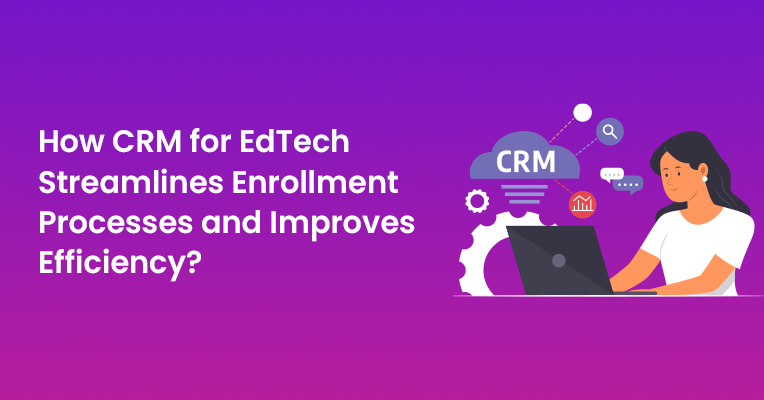In the rapidly growing and competitive EdTech industry, effective management and scaling of enrollments have become critical for educational businesses. The use of Customer Relationship Management (CRM) software is proving to be a game-changer for EdTech companies as they strive to attract and convert potential students amidst the proliferation of new start-ups aiming to revolutionize education. This article explores how CRM for EdTech industry streamlines enrollment processes and improves overall efficiency, helping educational businesses stay ahead in the market.
Understanding CRM for the EdTech Industry
A CRM (Customer Relationship Management) system tailored for the EdTech industry is a powerful software solution that enables educational companies to increase enrollments by managing and analyzing interactions with potential students and other stakeholders. The primary functions of a CRM in EdTech include lead generation, lead nurturing, marketing automation, segmentation, analytics, and outreach.
Lead Generation
With the help of a CRM, EdTech companies can track website visitors, social media activity, and other engagement data to identify potential students interested in their programs. This targeted approach allows them to focus on high-quality leads and optimize their marketing efforts.
Lead Nurturing
Once potential leads are identified, a CRM can be used to nurture and engage them through targeted marketing campaigns, personalized follow-ups, and other forms of communication. This personalized approach increases the chances of converting leads into enrolled students.
Marketing Automation
Education CRM software automates repetitive tasks like sending out emails and SMS, which saves time and enhances overall efficiency. Automation allows EdTech companies to focus on lead conversion and building relationships with students.
Segmentation
A CRM empowers EdTech companies to segment leads based on demographics, behavior, and other criteria. This segmentation helps in targeted marketing efforts, ensuring that potential students receive relevant and personalized information.
Analytics
Data and analytics provided by a CRM help EdTech companies make data-driven decisions. They can track student engagement, measure the success of marketing campaigns, and evaluate sales performance, enabling continuous improvement of enrollment strategies.
Outreach
CRM enables effective outreach to potential students via email, SMS, or other forms of communication. It helps schedule demos and consultations, ultimately converting leads into enrolled students.
Leveraging CRM for Improved Efficiency
CRM software offers various features that significantly enhance the efficiency of EdTech companies in managing enrollments. Here are some of the key benefits of leveraging CRM for improved efficiency:
Personalization
CRM software allows sales representatives to track lead stages and tailor communication to meet the unique needs of each student. This personalized approach leads to better engagement and higher enrollment rates.
Data Analysis
CRM enables EdTech companies to collect and analyze data on student engagement, providing valuable insights for improving educational programs and making data-driven decisions.
Lead Management
CRM software streamlines the process of managing leads, tracking enrollment, and enriching engagement. This automation improves conversion rates, increases revenue, and enhances retention rates.
Increased Efficiency
By automating administrative tasks involved in managing student data, CRM for EdTech saves educators’ time, allowing them to focus on delivering quality instruction and improving the overall learning experience.
Factors to Consider While Choosing a CRM for EdTech
Selecting the right CRM for EdTech is crucial for successful enrollment management. Here are key factors to consider when making your choice:
Integration
Ensure that the CRM can easily integrate with other systems such as Learning Management Systems (LMS), student information systems, and marketing automation tools. This integration streamlines business operations and improves data accuracy.
Lead Management
The CRM should efficiently track, segment, and nurture leads through personalized follow-ups and targeted marketing campaigns.
Marketing Automation
Look for built-in marketing automation capabilities to automate repetitive tasks like sending emails and SMS, saving time and enhancing overall efficiency.
Reporting and Analytics
Choose a CRM that provides comprehensive data and analytics on student engagement, marketing campaigns, and sales performance. These insights will help in making informed decisions and improving enrollment strategies.
User-friendliness
Opt for a CRM that is easy to use and navigate, ensuring effective system adoption and data accuracy.
Scalability
The CRM should be able to scale with the business as it grows, accommodating more users and data.
Customer Support
Consider the level of customer support provided by the CRM vendor to address any issues or queries that might arise.
Conclusion
In the dynamic and competitive EdTech industry, CRM software has emerged as a vital tool for streamlining enrollment processes and improving overall efficiency. By leveraging CRM for lead generation, lead nurturing, marketing automation, segmentation, analytics, and outreach, EdTech companies can attract and convert potential students more effectively.
CRM also enables personalization, data analysis, lead management, and increased efficiency, all of which contribute to the success and growth of educational businesses. When choosing a CRM for EdTech, careful consideration of integration, lead management, marketing automation, reporting, user-friendliness, scalability, and customer support is essential to make a data-driven decision that supports your company’s growth and success in the EdTech industry.




